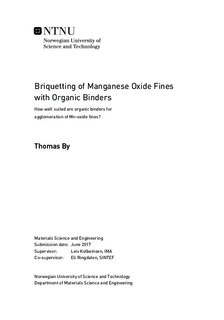Briquetting of Manganese Oxide Fines with Organic Binders - How well suited are organic binders for agglomeration of Mn-oxide fines?
Master thesis
Permanent lenke
http://hdl.handle.net/11250/2453618Utgivelsesdato
2017Metadata
Vis full innførselSamlinger
Sammendrag
Dust and fines are created throughout the ferromanganese metal production. These fines are collected from ventilation filters, screening operations and off-gas cleaning facilities. As the fines contain a substantial amount of manganese it would be beneficial to charge them to the SAF (submerged arc furnace). Due to furnace design, it is sensitive to fines of sizes smaller than 6mm. These fines clog channels in the charge layer, trapping gas produced deep in the furnace and hazardous situations and unpredictable furnace operation arise.In this work, manganese containing fines collected and delivered by Eramet Norway has been agglomerated through briquetting in combination with different binders. The binders were; Lime/molasses, magnesium-lignosulfonate and low dosage bentonite, the two first are organic binders and bentonite inorganic. The organic binders were tested in different dosages and were the focus area of this thesis.Two briquetting techniques were performed; uniaxial pressing and roll pressing. The uniaxial pressing was used to compare binders directly in green state (made but untreated), where it was concluded that the highest dosages of lime/molasses and lignosulfonate gave the strongest green strength briquettes.The two high-dosage organic binder briquettes were then reproduced with the roll press technique, which is the production method which is considered for industry purposes, to investigate further furnace operation potential. They were strength tested in green state and treated at different temperatures; 105°C, 300°C, 500°C and 800°C prior to compression strength testing. The evolution of strength from heat treatment gave the results of strength gain when dried, then steady decrease in strength from 300°C up to 800°C, this most probably due to organic binder burn-off at around 300°C. This leaves the briquettes weakened for a long temperature interval and strength gain from sintering is not believed to occur before 1200°C is reached.From long-term storage, it was noted that none of the different binder briquette types decreased notably in strength from storage intervals of 5 weeks. It is believed that mold formation in stored briquettes will not be a problem if stored for less than 30 days in a humid environment, or if stored dry, longer storage times will be possible.
